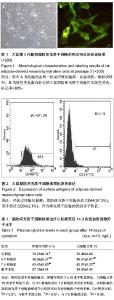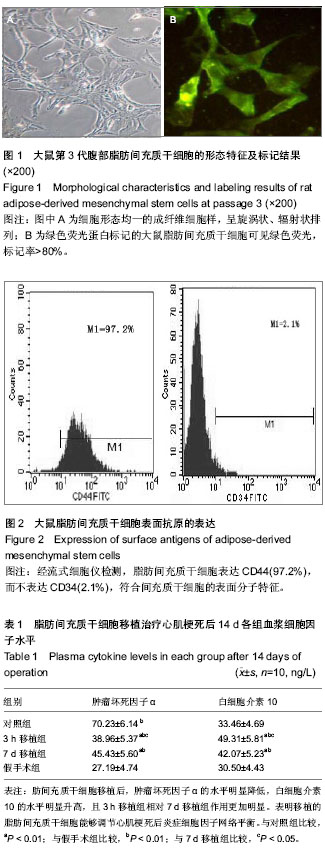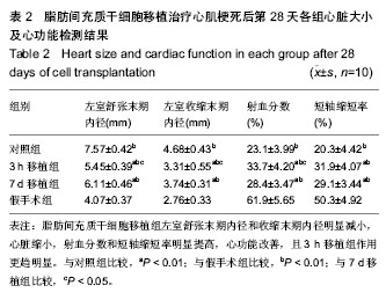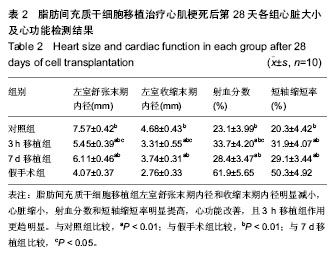| [1] Tang J, Xie Q, Pan G, et al. Mesenchymal stem cells participate in angiogenesis and improve heart function in rat model of myocardial ischemia with reperfusion.J Eur J Cardiothorac Surg. 2006;30(2):353-361.[2] Joshua M, Jay H, Timothy D, et al. A randomized, double-blind, placebo-controlled, dose-escalation study of intravenous adult human mesenchymal stem cells (prochymal) after acute myocardial infarction.J Journal of the American College of Cardiology. 2009;54(24):2277-2286.[3] Blatt A, Minha S, Moravsky G, et al. Intracoronary administration of autologous bone marrow mononuclear cells in patients with chronic ischemic symptomatic cardiomyopathy: 5 years follow-up. Isr Med Assoc J. 2010; 12(12):738-741. [4] Bartunek J, Sherman W, Vanderheyden M, et al. Delivery of biologics in cardiovascular regenerative medicine.J Clin Pharmacol Ther. 2009;85(5):548-552.[5] Enoki C, Otani H, Sato D, et al. Enhanced mesenchymal cell engraftment by IGF-1 improves left ventricular function in rats undergoing myocardial infarction. Int J Cardiol. 2010;138(1): 9-18. [6] Numata A,Miyauchi Y,Ono N,et al.Spontaneous Atrial Fibrillation Initiated by Tyramine in Canine Atria with Increased Sympathetic Nerve Sprouting.J Cardiovasc Electrophysiol.2012;23(4):415-422.[7] Okura H, Matsuyama A, Lee CM, et al. Cardiomyoblast-like cells differentiated from human adipose tissue-derived mesenchymal stem cells improve left ventricular dysfunction and survival in a rat myocardial infarction model. Tissue Eng Part C Methods. 2010;16(3):417-425.[8] Jaremo P, Nilsson O. Interleukin-6 and neutrophils are associated with long-term survival after acute myocardial infarction. Eur J Intern Med. 2008;19(5):330-333.[9] 吴祖常,吴国才,吴智明,等.干细胞生长因子和粒细胞集落刺激因子与心肌梗死大鼠体内骨髓间充质干细胞的迁移[J].中国组织工程与临床康复,2011,15(36):6737-6740.[10] 吴贤仁,杨敏,陈广玲.急性心肌梗死病人炎性细胞因子水平的动态变化及意义[J].中国基层医药,2004,11(6):647-648.[11] Anzai T. Post-infarction inflammation and left ventricular remodeling: a double-edged sword. J Circ. 2013;77(3):580- 587.[12] Shantsila E, Tapp L D, Wrigley B J, et al. Receptors to interleukin-6 and adhesion molecules on circulating monocyte subsets in acute myocardial infarction.J Thromb Haemost. 2013;109(2):255-262.[13] Chen GY, Nunez G. Sterile inflammation: sensing and reacting to damage. J Nat Rev Immunol. 2010;10(12): 826-837.[14] Ammirati E, Cannistraci CV, Cristell NA, et al. ification and predictive value of interleukin-6+ interleukin-10+ and interleukin-6- interleukin-10+ cytokine patterns in ST-elevation acute myocardial infarction. Circ Res. 2012;111(10): 1336-1348. [15] Hofmann U, Frantz S. How can we cure a heart "in flame"? A translational view on inflammation in heart failure. Basic Res Cardiol. 2013;108(4):356. [16] Mann DL. argeted anticytokine therapy and the failing heart. Am J Cardiol. 2005;95(11A):9C-16C. [17] 余涛,李京波,魏盟.炎症反应在心肌梗死后交感神经重构中的作用[J].实用医学杂志,2012,28(10):1744-1745.[18] Akiyama K, Chen C, Wang D, et al. Mesenchymal- stem-cell-induced immunoregulation involves FAS-ligand-/FAS-mediated T cell apoptosis. Cell Stem Cell. 2012;10(5):544-555. [19] Matysiak M, Orlowski W, Fortak-Michalska M, et al. Immunoregulatory function of bone marrow mesenchymal stem cells in EAE depends on their differentiation state and secretion of PGE2. J Neuroimmunol. 2011;233(1-2):106-111. [20] Méndez-Ferrer S, Michurina TV, Ferraro F, et al. Mesenchymal and haematopoietic stem cells form a unique bone marrow niche. Nature. 2010;466(7308):829-834. [21] Beyth S, Borovsky Z, Mevorach D, et al. Human mesenchymal stem cells alter antigen-presenting cell maturation and induce T-cell unresponsiveness. Blood. 2005;105(5):2214-2219.[22] Bartholomew A, Sturgeon C, Siatskas M, et al. Mesenchymal stem cells suppress lymphocyte proliferation in vitro and prolong skin graft survival in vivo. Exp Hematol. 2002; 30(1): 42-48. [23] Fong CY, Chak LL, Biswas A, et al. Human Wharton's jelly stem cells have unique transcriptome profiles compared to human embryonic stem cells and other mesenchymal stem cells. Stem Cell Rev. 2011;7(1):1-16. [24] Ning HM, Jin JG, Hu JW, et al. Effect of human bone marrow mesenchymal stem cell on allogeneic T lymphocyte phenotype in vitro. Zhongguo Shi Yan Xue Ye Xue Za Zhi. 2005;13(1):43-49.[25] Prockop DJ, Oh JY. Mesenchymal stem/stromal cells (MSCs): role as guardians of inflammation. Mol Ther. 2012; 20(1): 14-20. [26] 邓柳霞,艾旗,袁春菊,余国龙.人脐血单个核细胞静脉移植联合复方丹参滴丸对急性心肌梗死局灶炎症反应的影响[J].中国组织工程研究,2013,33(11):1532-1537.[27] 张嵬,杨力,张亚东,等.人脐带间充质干细胞移植对小型猪急性心肌梗死模型心肌细胞再生的影响[J].山东医药,2013,53(9): 29-32.[28] 肖文涛,高传玉,戴国友,等.不同类型自体骨髓干细胞序贯移植治疗急性心肌梗死的临床观察[J].临床心血管病杂志,2013,29(5): 370-373.[29] 李侠,郭燕,胡有东,等.脐带间充质干细胞治疗老年人陈旧性心肌梗死对血小板糖蛋白和内皮细胞黏附分子的影响[J]. 中华老年医学杂志,2013,32(6):582-585.[30] 王建军,刘兴炎,李旭升.成人脂肪间充质干细胞体外长期培养后的成骨分化潜能[J].中国组织工程研究与临床康复,2009, 13(36): 7020-7024.[31] Franquesa M, Hoogduijn MJ, Baan CC. The impact of mesenchymal stem cell therapy in transplant rejection and tolerance. Curr Opin Organ Transplant. 2012;17(4):355-361. [32] 王建军,樊艳,马爱群,等.人脂肪间充质干细胞的免疫调节作用[J].中国组织工程研究,2012,16(45):8430-8434.[33] Gottumukkala RV, Lv H, Cornivelli L, et al. cardial infarction triggers chronic cardiac autoimmunity in type 1 diabetes. Sci Transl Med. 2012;4(138):138ra80. [34] Gordon JW, Shaw JA, Kirshenbaum LA. Multiple facets of NF-κB in the heart: to be or not to NF-κB. Circ Res. 20119; 108(9):1122-132.[35] Nabeebaccus A, Zhang M, Shah AM. NADPH oxidases and cardiac remodelling. Heart Fail Rev. 2011;16(1):5-12. [36] Westermann D, Becher PM, Lindner D, et al. Selective PDE5A inhibition with sildenafil rescues left ventricular dysfunction, inflammatory immune response and cardiac remodeling in angiotensin II-induced heart failure in vivo. Basic Res Cardiol. 2012;107(6):308. [37] Dupont M, Tang WH. Right ventricular afterload and the role of nitric oxide metabolism in left-sided heart failure. J Card Fail. 2013;19(10):712-721. [38] Bradham WS, Bozkurt B, Gunasinghe H, et al. Tumor necrosis factor-alpha and myocardial remodeling in progression of heart failure: a current perspective. Cardiovasc Res. 2002 ;53(4):822-830. [39] Yang Z, Zingarelli B, Szabó C. Crucial role of endogenous interleukin-10 production in myocardial ischemia/reperfusion injury. Circulation. 2000;101(9):1019-1026.[40] Ouyang W, Rutz S, Crellin NK, et al. Regulation and functions of the IL-10 family of cytokines in inflammation and disease. Annu Rev Immunol. 2011;29:71-109. [41] 赵然尊,龙仙萍,刘志江,等.人受体活性修饰蛋白1基因修饰间充质干细胞调节兔心肌梗死后炎症及对其心脏修复的作用[J].中华心血管病杂志,2012,40(9):736-741.[42] 肖立运,张卫泽,陈永清,等.脂肪间充质干细胞移植对兔心肌梗死后心功能及凋亡的影响[J].西北国防医学杂志, 2010,31(3): 173-175.[43] Choi H, Lee RH, Bazhanov N, et al. Anti-inflammatory protein TSG-6 secreted by activated MSCs attenuates zymosan-induced mouse peritonitis by decreasing TLR2/NF-κB signaling in resident macrophages. Blood. 2011; 118(2):330-338.[44] Roddy GW, Oh JY, Lee RH, et a1. Action at a distance: systemically administered adult stem/progenitor cells(MSCs) reduce inflammatory damage to the cornea without engraftment and primarily by secretion of TNF-alpha stimulated gene/protein 6. J Stem Cells. 2011;29(10): 1572-1579.[45] Lee RH, Pulin AA, Seo MJ, et a1. Intravenous hMSCs improve myocardial infarction in mice because cells embolized in lung are activated to secrete the anti-inflammatory protein TSG-6. J Cell Stem. 2009;5(1): 54-63.[46] Nemeth K, Leelahavaniehkul A, Yuen PS, et a1. Bone marrow stromal cells attenuate sepsis via prostaglandin E(2)-dependent reprogramming of host macrophages to increase their interleukin-10 production. J Nat Med. 2009; 15(1): 42-49. |



